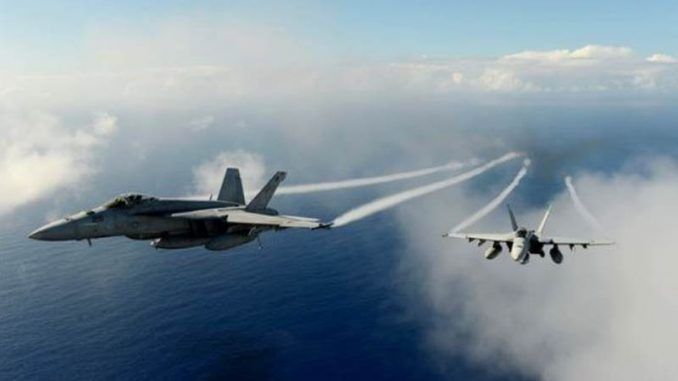
The general heading the U.S. Air Forces Central Command said today that the reduction in U.S. and coalition air strikes on Islamic State targets in Syria should increase in the future.
This follows a lull in September and October, which was blamed on “bad weather” and not Russia’s start of her own air campaign in the region with the support of the locals.
Reuters reports:

BYPASS THE CENSORS
Sign up to get unfiltered news delivered straight to your inbox.
You can unsubscribe any time. By subscribing you agree to our Terms of Use
Lieutenant General Charles Brown told reporters at the Dubai International Air Chiefs Conference that the reduction in air strikes was due to weather and to a slowdown in activity on the ground and not due to the start of Russian air strikes in the region.
He said both government forces and insurgents were increasing their ground movements, which could create more opportunities for the United States and its allies to carry out more air strikes against Islamic State targets.
“If they’re not out and about, it’s harder to strike, particularly for an adversary that may wrap themselves in the civilian population,” he said.
Brown also rejected criticism that the United States was not using air strikes as much or effectively as possible, saying coalition forces were striving to avoid civilian casualties that could help recruitment for Islamic State.
He also noted that the sheer number of air strikes was less of an indicator than the targets hit and the number of weapons used.
Zero Hedge reports on the U.S. plan to bomb terrorist targets in Syria once the skies are blue for November:
On September 30, a Russian general walked into the US embassy in Baghdad and told US diplomats that Moscow would commence air operations in Syria in “one hour.”
It would be best, he said, if the US stayed out of the way.
The general was affiliated with the newly created Iraqi intelligence cell staffed by Russia, Syria, and Iran. It was both hilarious and intriguing that Moscow gave such short notice and didn’t share any information about who Russia intended to target.
At a base level, it was exceptionally amusing that The Kremlin essentially walked into a US embassy, told the US military to leave the skies above Syria or risk being shot down, and then walked out. But more specifically, the fact that Moscow gave only an hour’s notice and did not provide anything in the way of details seemed to underscore Russia and Iran’s shared suspicions that the US is backing any number of Sunni extremist groups fighting for control of the country. That is, Moscow didn’t want Washington to have the time or the information necessary to warn ISIS or any of the West’s other proxy armies.
In the weeks since Russia began flying combat missions from Latakia, the perception has been that Moscow’s warplanes have been far more effective at targeting extremists than American fighter jets. It is of course impossible to determine if the videos emanating from the Russian Defense Ministry depict what they purport to depict, but by all accounts, this is a far more aggressive campaign than that which the US launched some 13 months ago. It’s also been clear from the location of Russia’s strikes that although shoring up Assad in the west (i.e. securing Syria’s major cities for the regime) was the immediate priority, Moscow has effectively established a no-fly zone over the country and, if you believe Ankara, Russia has even ventured into Turkish airspace a time or two (or three, or four).
Obviously, this threw the Pentagon into disarray. It was no longer clear where the US could fly without risking a dogfight with a Sukhoi, and it was no longer clear who the US could support with airstrikes without pissing off Moscow.
And so, with its bluff thus called, the US simply stood aside and watched as Russia and Iran began to systematically dismantle the opposition funded by Riyadh, Doha, and Ankara.
Or at least that’s how any rational observer would interpret the situation.
Edmondo Burr
CEO
Assistant Editor
Latest posts by Edmondo Burr (see all)
- Police Arrest Suspect In Supermarket Baby Food Poisoning - October 1, 2017
- Seoul Secures Data From Electromagnetic Interference By N Korea - September 30, 2017
- The ‘World’s First Internet War’ Has Begun: Julian Assange - September 30, 2017


Be the first to comment